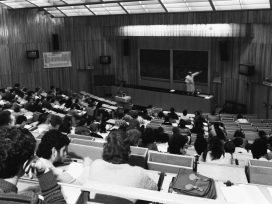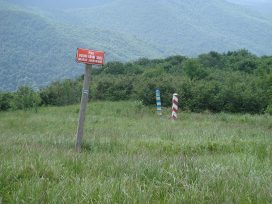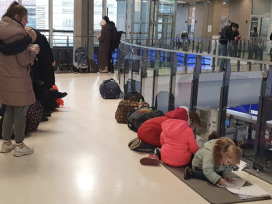Defenders of human rights often face high stakes. When the Ukrainian Helsinki Group openly challenged the Soviet Union in the name of the 1975 Universal Declaration of Human Rights, young dissidents soon became political prisoners. The price for being a non-conformist was steep yet encouraged solidarity, paving the way to Euromaidan.
Myroslav Marynovych, author of The Universe Behind Barbed Wire: Memoirs of a Soviet Ukrainian Dissident, speaks to the Institute for Human Sciences’ Timothy Snyder.
Timothy Snyder: When was the first time you got in trouble with the law? What was your first encounter with the police?
Myroslav Marynovych: The first time I was taken to a police station was following a visit to the Taras Shevchenko monument in Kyiv. I went there to commemorate the date when the poet was reburied on Ukrainian soil. The government expected its loyal citizens to willingly and enthusiastically abandon any rudimentary vestiges of nationalism – to use a parody of the Soviet vocabulary. Even though it wasn’t officially prohibited, laying flowers by the monument still violated this taboo.
Together with Mykola Matusevich, my friend at that time, and Natalya Yakovenko, now a very famous historian in Ukraine, I laid flowers by the monument in the morning. When we dispersed, I headed for Zhuliany airport for my flight back to Ivano-Frankivsk, where I lived at that time. But at the airport I was apprehended and taken to the nearest police station. My things were searched, and eventually the crucial question was posed about the purpose of our visit to the Shevchenko monument.
Timothy Snyder: This moment helps us comprehend how Soviet Ukraine operated. You are arrested for laying flowers at the monument of the great Ukrainian poet, but at the same time there is a monument of the great Ukrainian poet standing there. There is a degree of tension and fluidity in the kind of Ukrainianness that is deemed acceptable, and it is not made explicit – as you say, it’s more like a taboo.
In the early 1970s you were a young man from Galicia spending time in Kyiv. What did you think about the Soviet Union? Did you see a future for Ukraine?
Myroslav Marynovych: The first picture that comes to my mind is of me having my ear glued to the ‘enemy voices’ of Radio Liberty, Voice of America, the BBC and Deutsche Welle. It was rather hard work to distinguish the voice of the announcer beyond the Soviet signal jamming. These programmes were forbidden in the Soviet Union; listening to them formed my critical attitude from early on.
But in a deeper sense, it was the Prague Spring that had the most significant influence on my developing world view. In the next image that comes to mind I am a young man in Lviv in September 1968, witnessing Soviet tank divisions as they returned from Czechoslovakia after crushing Prague’s defiant love of freedom. In August, when five Soviet bloc armies occupied Czechoslovakia, I had followed events as they unfolded, never taking my ear away from the radio receiver. My heart was on the side of the vanquished, and in my soul I silently mourned Jan Palach, who had publicly immolated himself in protest against the Soviet occupation. Along with thousands of Lviv residents, I was now looking into the downcast, nervous faces of the soldiers on their tanks. Everyone was quiet and morose. The silence was absolute.
In the third picture, I am singing traditional koliada in Kyiv, although the KGB had done everything in its power to prevent Christmas carolling. Out of precaution, we decided to take our passports with us in case we were brought in; and under no circumstances would we accept any invitations for a drink. As we walked around in a compact group, people reacted warmly to our carolling and this lifted our mood, but we were still keenly aware of being closely watched. Policemen would approach us to say, ‘Stop it, go home’. But ordinary people greeted us very cordially. In the stores we were showered with candy and in public transport we elicited smiles.
All these memories show our spiritual and ideological opposition to Soviet reality.
Timothy Snyder: From your perspective, you were opposing something by singing or by looking carefully in someone else’s face. In terms of political history, it was the beginning of the Brezhnev era, the invasion of Czechoslovakia in 1968 being one of its signature moments, along with the idea of normalization – that we should accept the world as it is, without questioning it. The things that you were doing, though, were unpredictable, joyful and somehow outside of the realm of politics, or in and out of politics at the same time.
In 1972, as you moved to Kyiv as a young man, the leadership of the Communist Party of Soviet Ukraine changed, setting off a period of Russification. Anyone who visited Kyiv in the late Soviet period thought of it as a provincial Russian speaking city. And yet your Kyiv was joyful, colourful, and full of friends. Why was the city so important to who you became?
Myroslav Marynovych: My parents lived in Poland before the war, and for them Kyiv was a doomed golden dreamland beyond the Zbruch river, the border line to the Soviet Union. For me, Kyiv had already been my land, my natural gravitational centre, and it was to this centre that I had flown like a moth drawn to the light. Life was momentous in my Kyiv – or I could say ‘our’ Kyiv, because once I moved to the capital Mykola Matusevich and I became inseparable, to the point that people often mixed up our names. It had three major elements: trying to keep up the spirit of persecuted patriots and their families; participating in Ukrainian cultural life and organizing our own events; and living a life of youthful fun. Often, it would have been difficult to differentiate between these activities.
However, any effort to preserve Ukrainianness was considered the gravest sin of nationally conscious Ukrainians. Two young men – let alone a larger group of people – openly speaking Ukrainian without any inhibitions was perceived as rebellion in itself. I can still remember the harsh looks of my fellow Kyivans in public transport or on the street. They tried to distance themselves from us because they were afraid.
My critical attitude to Kyivans later changed following the 2004 Orange Revolution, and especially since the Revolution of Dignity in 2013-14, when they warmly supported protesters. It was very important for all of us who participated in the Maidan.
Timothy Snyder: Many think of human rights as abstract, distant and cold. For you, they are directly connected to the things we want to do because of who we are, with expressing our personalities – in a Christmas carol or in a loud conversation, for instance. Your experience of human rights is very concrete. But it’s also historically concrete: you arrived in Kyiv when the idea was taking form. In what ways did that notion come into your life?
Myroslav Marynovych: The idea of human rights stormed into my life through three main sources. On 1 August 1975, at the Helsinki Conference on Security and Co-operation in Europe, Brezhnev signed the Final Act on behalf of the Soviet Union. The third basket required all signatories to respect human rights. No doubt at that time Brezhnev had no inkling that some people would take this document – and his signature – seriously. But the Ukrainian Helsinki Group took this task on and became a litmus paper that revealed to the world that the Soviet Union continued to blatantly violate human rights. By divulging to the western world numerous violations of the Universal Declaration of Human Rights and the Helsinki Accord, we could hold up the evidence to prove that the Soviet system was anti-democratic and that Brezhnev’s signature on any such document was meaningless.
US President Jimmy Carter was the second force that inspired me to take up the cause of human rights. He became an outstanding spokesman at that time, the first statesman who brought the civil society struggle into the realm of international relations. Obviously, he didn’t manage to achieve all his goals. But Carter can undeniably be credited with establishing a culture of human rights. He became my hero, and his goal to protect human rights resonated with me. Many years later, in 1997, I had the opportunity to thank him personally during a brief meeting in the office of the Carter Center in Atlanta.
The third force, a Ukrainian one, was the voice of Oksana Meshko. One evening, Mykola Matusevich and I ran into her in Kyiv. Oksana told us that the eminent dissident Mykola Rudenko was organizing a group that would fight for human rights, and suggested that young people like us were needed. She invited us to join in. As we parted ways with her, we both felt the first murmurs of a new fate. I remember that moment very clearly. On the one hand, we had no illusions. We both understood that we would inevitably end up getting arrested. On the other hand, we also understood that if we declined to join the group, we would never be able to forgive ourselves. I was 27 at that time; self-respect at that age is central. So I joined the human rights movement, and it was probably the most important day in my life.
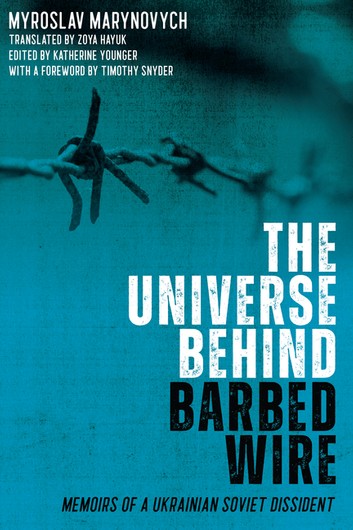
The Universe Behind Barbed Wire: Memoirs of a Soviet Ukrainian Dissident. Credit: Myroslav Marynovych via Rakuten Kobo
Timothy Snyder: When you joined the Ukrainian Helsinki Group, everyone else was older and more experienced than you. What did the group mean to you at the time? And how do you think about it now?
Myroslav Marynovych: In comparison with all other members of the Ukrainian Helsinki Group, Mykola and I looked politically rather unsophisticated. I was focused more on political disobedience than on any deep engagement with the core issue of human rights.
The deceitfulness of the Soviet system during my years as a dissident had reached such grotesque proportions that it was no longer possible to tolerate it and maintain self-respect. Therefore, at the beginning I saw our work not so much as a struggle for political ideals, but first and foremost as an attempt to regain and retain our dignity as human beings. In my mind, the pain of Ukrainian national humiliation and the anguish of totalitarian oppression were inseparable from the notion of human rights.
We partnered with Russian dissidents, but there was a clear difference between the Moscow Helsinki Group and the various other national groups: Ukrainian, Lithuanian, Georgian, and Armenian. We were considered by our Russian counterparts as a bit polluted by nationalistic demands, because we combined our fight for human rights with striving for sovereignity. Russian dissidents stood all exclusively for human rights in the sense of civic rights.
A movement for Ukrainian liberation had existed prior to us, showing enormous courage. But for the average Soviet citizen, underground organizations were not convincing. ‘They must be enemies; otherwise, why would they be hiding?’, they thought. The unconcealed public existence and activities of the Ukrainian Helsinki Group were very significant in this regard. Our names and addresses were known to the KGB from the very beginning, and we did not hide.
Timothy Snyder: The public character of what you and other Ukrainian Helsinki Group members did was about setting an example of public disobedience. But it came at a price: in joining the group, you knew that you would be arrested. But you couldn’t have known what that would have meant exactly. It took almost a year after your arrest until the sentence. At 27 or 28 years old, that’s a huge chunk of your life. What did you learn about yourself and about the Soviet system during interrogation?
Myroslav Marynovych: First of all, I learned from the interrogator that I had been given the status of an exceptionally dangerous state criminal, which I found very ironic and extremely funny. Once I even commented on it, ‘It seems that murderers are not considered as dangerous by the Soviet authorities as we dissidents are’. My interrogator shook his head and replied, in all seriousness, ‘Yes, murderers are not as dangerous as you because they don’t infect others’.
I often pointed out certain irrational aspects of the investigation. For example, my interrogator would constantly repeat that they were putting me on trial not because of my beliefs but for what I was saying – that is, for my concrete actions. Apparently, the Soviet Union had clearly made a scientific discovery, managing to perform a unique lobotomy between thought and speech.
I didn’t have anything to be afraid of. I knew very clearly that, by refusing to repent, I would have received the maximum term. I ended up being incarcerated in Perm-36, in a facility out in the countryside, and stayed in this concentration camp for six years.
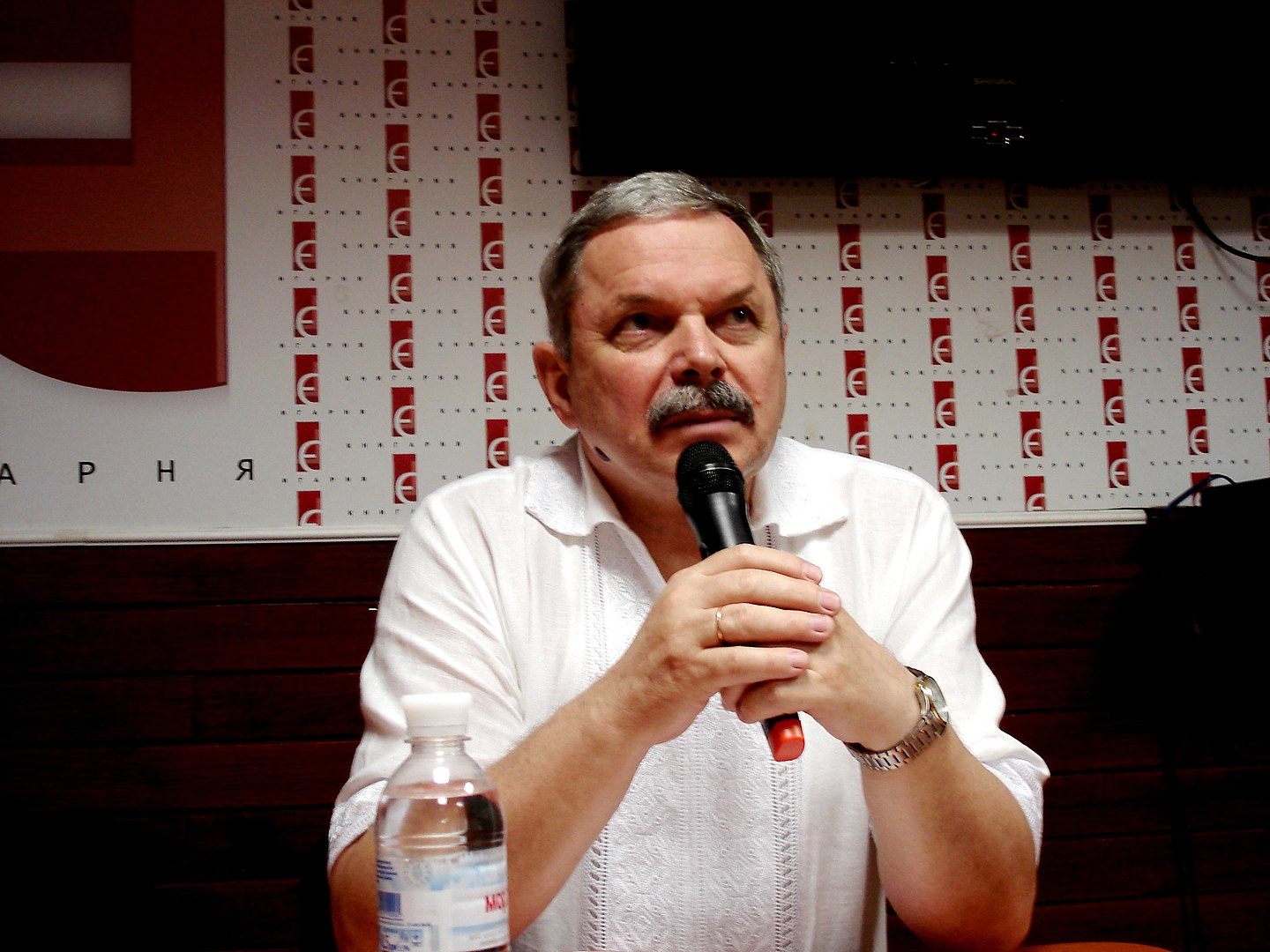
Photo by Kharkivian (Сергій Петров), CC BY-SA 3.0, via Wikimedia Commons
Timothy Snyder: What you say tells us something very important about the political philosophy of the Brezhnev era. The Soviet system did not need believers at that point. It needed people who were separate from politics, from values; who were willing to keep quiet, to conform.
As for the human rights movement in the ‘70s and ‘80s, it was very much concerned with facts: who suffered, what their name was, what they were sentenced for, what they actually did. These are the basic facts that constitute real history. In your memoirs, you often try to make sure that we remember everyone’s name – someone from the Caucasus, someone from Estonia, someone who otherwise might be forgotten.
Myroslav Marynovych: We were very disciplined in collecting information. It was important to be objective and testify to other persecutions. I remember how careful we were to include facts, exclusively facts, not our attitudes toward them. And I remember the emotions we felt when we assembled all this information to be smuggled through to the western world. This information later formed the Chronicle of Current Events, the famous publication on civil rights violations.
Timothy Snyder: For someone who has no idea about what life in Perm-36 was like, what facts would you start from?
Myroslav Marynovych: Struggle and punishment were inseparable elements that penetrated all aspects of camp life for every prisoner. The administration was convinced that our ideological disagreement with the Soviet status quo gave them a justifiable, viable legal basis for constantly finding new ways of punishing us. We wanted to fight for our rights and the camp administration wanted to persecute us.
Let me give you a few examples. Yosef Mendelevich, a Jewish prisoner, quoted camp physician Dr. Petrov in his memoirs: ‘I’m a member of the KGB, first and foremost, and only then a physician’. Dr. Petrov was a short man with a distinctive sense of humour. When I developed gum disease after a hunger strike, he told me during a consultation with a smirk: ‘All you need is some vitamins. Strawberries!’. A clearly sarcastic proposal for a labour camp’s diet.
Timothy Snyder: You tell of your experience in the camp as a story of humility, but not a boring, ostentatious one. It’s humorous, almost self-aware humility, similar to that in the letters you wrote to your mother and your sister from the camp, where you had to find indirect ways to speak about what was happening, often employing jokes.
In your memoirs, for example, it becomes clear after a while that you spent much of your term in an isolation cell, although you never actually say so. Yet you insist that you and the people with whom you identified in the camp were free. What do you mean by that?
Myroslav Marynovych: All human rights defenders who ended up as political prisoners were classified by Amnesty International as prisoners of conscience, and that is the key word to explain my attitude towards freedom. For me, freedom meant – and still means – to follow the advice of my conscience. Freedom is not all-permissiveness, but the ability to stick to my values and not change my principles in the face of pressure. When I speak of values, I mean the basic values that are in the DNA of human civilization: human dignity, goodness, solidarity.
This is freedom for me, to follow my conscience.
Published 25 October 2021
Original in English
First published by Eurozine
Contributed by The Institute for Human Sciences (IWM) © Myroslav Marynovych / Timothy Synder / The Institute for Human Sciences (IWM) / Eurozine
PDF/PRINTIn collaboration with
In focal points
Newsletter
Subscribe to know what’s worth thinking about.
Related Articles
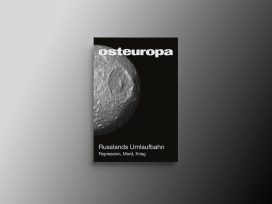
Russia’s orbit
Osteuropa 4/2024
Repression, murder, war: on the logic driving the Putin regime toward ever-greater excesses of violence. Featuring Yuri Andrukhovych on the Russian colonial empire – the only ever to have tried to reconquer a former possession. Also: articles on Navalny, and on what next for Georgia?
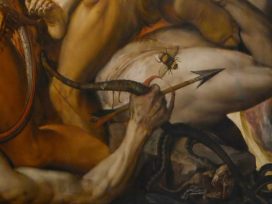
The difference between knowing from distance that war is being waged and living that reality couldn’t be more extreme. But can awareness of multiple repercussions turn protective disassociation from violence into active solidarity? ‘The Most Documented War’ symposium in Lviv, Ukraine, provides valuable pointers regarding engagement and responsibility.




